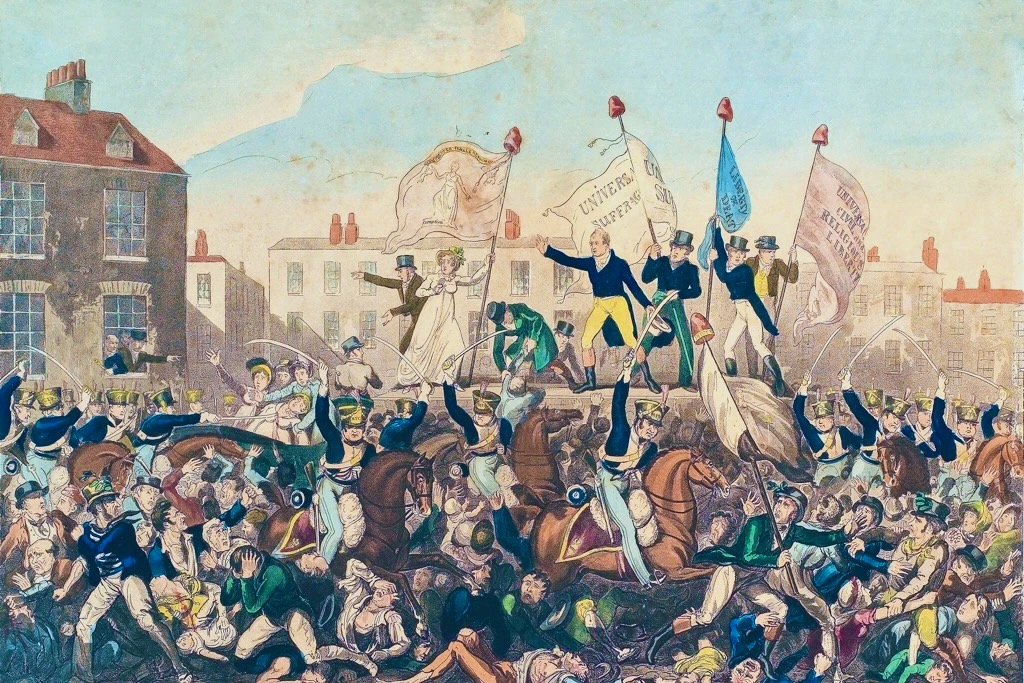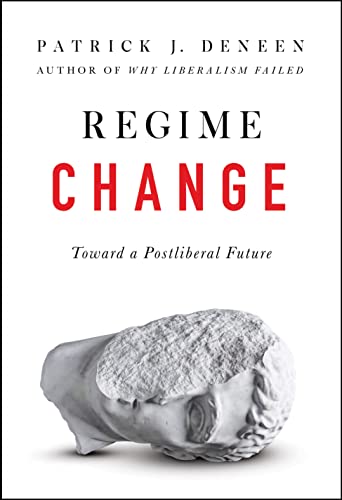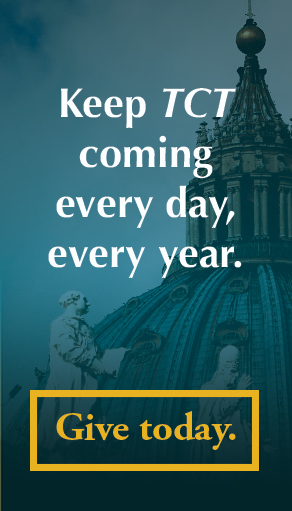The New York Times called it “brilliant and demanding,” but the 2018 British film Peterloo grossed less than $2 million in its U.S. box office. The reason is simple. We Americans are bad at our own history, let alone anyone else’s. Peterloo tells the story of the Peterloo massacre in Manchester, England, a defining event in modern British history, but of little interest this side of the Atlantic. Which may be a mistake.
On August 16, 1819, some 60,000 hungry, unarmed workers, with their wives and children, converged on St. Peter’s Field in Manchester to peacefully demand economic and political reform. Barely 11 percent of Britain’s people had the right to vote at the time. Factory conditions in the early years of the Industrial Revolution were abysmal. Meager pay, widespread unemployment, and child labor savaged family life. The poor sank more deeply into poverty. The rich got richer on profits from a system structured to benefit England’s ruling class.
The response of authorities that day was instructive. Cavalry and bayonet-wielding infantry charged into the protesters. They killed 18 and wounded up to 700. Despite public outrage at the slaughter, the government followed up with a national crackdown on dissent. This involved police raids, mass arrests, harsh anti-sedition laws, and jail sentences. It took decades for the British reform movement to recover and succeed.
History never repeats itself. But patterns of human thought and behavior repeat themselves all the time. That’s why the past has so many lessons for the present. One of them is this: Every society has an elite leadership class, no matter how well disguised. That includes democracies. It thus includes our own.

That needn’t be a negative, as Patrick Deneen observes in his compelling new book, Regime Change: Toward a Postliberal Future. When elites exercise their advantages for the common good; when they’re willing to listen to, and “blend” with, the people they lead in a mutually supportive way; a culture thrives.
The problems come, as they almost always do, when a leadership class starts believing in its own inherent superiority and the deserved nature of its success. . .and in the inherent inferiority and deserved failure of the unwashed masses. Elites that ignore the people they lead are asking for trouble. And they usually get it.
For all of its destructive stupidity, the January 6, 2021, Capitol riot was a burst of plebeian anger at a political patrician class correctly perceived as contemptuous of ordinary citizens in “flyover country” – their religion, needs, and concerns. The elite hysteria and vindictive punishments that followed the D.C. riot simply proved the point.
Peterloo and the Capitol riot are vastly different events in almost every way, and Deneen has no sympathy for the latter. Yet it’s worth noting (as I’ve previously written) that today in the United States, 70 percent of the nation’s wealth is in the hands of the top 10 percent of the population. The bottom 50 percent of the population, our plebeian class, has 2.5 percent of the wealth. And our wealth inequality is growing faster than in any other advanced economy. Marriage, family life, meaningful work, and emotional health are all in varying states of dysfunction across the “loser” half of America’s economic scene.
And much of that suffering is traceable, as Deneen shows, to a culture of fragmentation advanced in the name of “liberty,” “choice,” and “progress” by elites with the resources to enjoy the fruits of their libertine policies, while insulating themselves from any toxic effects.
In this, Deneen persuasively builds on the legacy of the late Christopher Lasch in The True and Only Heaven and The Revolt of the Elites and the Betrayal of Democracy. Unlike Lasch though, Deneen is not just a gifted scholar but also a Catholic believer. His faith shapes key elements of his argument and provides background radiation to the entire text.
I highlighted nearly a quarter of the book as I read it. At points, the text feels like a manifesto. John Locke and John Stuart Mill are not among Deneen’s heroes. . .to put it kindly. Yet the author writes not just with passion but also with engaging clarity and considerable analytical skill. He draws on Aristotle, Polybius, Aquinas, Pierre Manent, Michael Lind (The New Class War), Michael Sandel (The Tyranny of Merit), and many others to claim that, given our country’s ongoing “Cold Civil War,” what we actually need
is regime change — the peaceful but vigorous overthrow of a corrupt and corrupting liberal ruling class and the creation of a postliberal order in which existing political forms can remain in place, as long as a fundamentally different ethos informs those institutions and the personnel who populate key offices and positions. While superficially the same political order, the replacement of rule by a progressive elite [with] a regime ordered to the common good through a mixed constitution [i.e., a thorough blending of classes] will constitute a genuine regime change.
Language like that invites criticism, of course, if not a political freak-out. But for those willing to listen, Deneen provokes some fresh – and much-needed – thinking about how and why we ended up in our current secularized, conflictive, morally vapid mess. He also offers practical steps to get where we need to go, although that road – given the realities of our environment – may be harder to follow than the author seems to think.
One needn’t accept all of Deneen’s arguments to admire its conviction and purpose. It gives articulate voice to a very widespread popular frustration with leaders who abuse their privileged status by disdaining the very people they lead – and their beliefs. And history suggests that such disdain has unpleasant consequences.
In the end, Regime Change, like Deneen’s earlier work Why Liberalism Failed, is “radical” in the original sense. It challenges the roots and development of Enlightenment-inspired liberal society with a “common good conservatism” grounded in the Biblical faith of America’s early colonizers.
And that warrants both our attention and our gratitude.


















